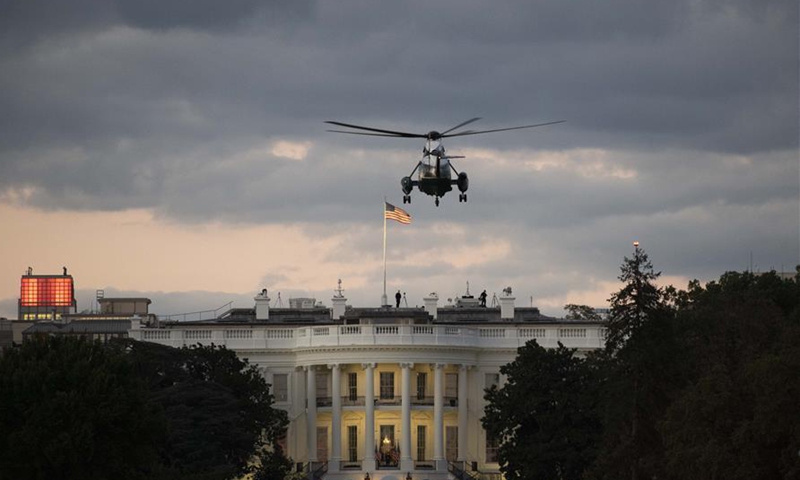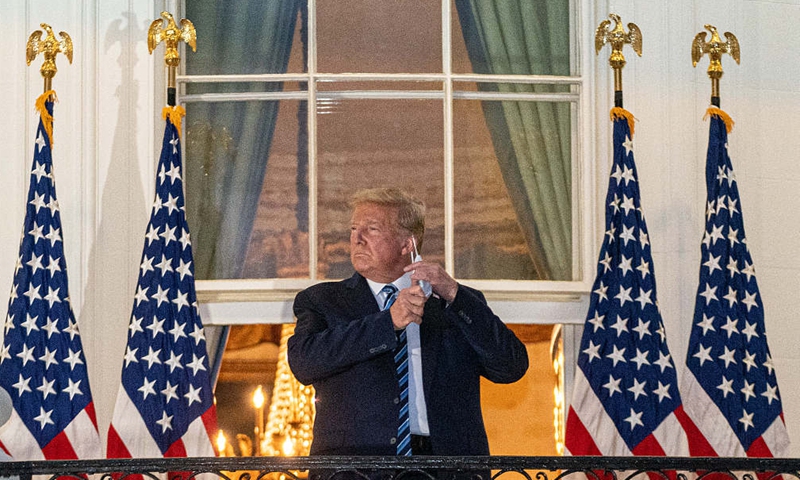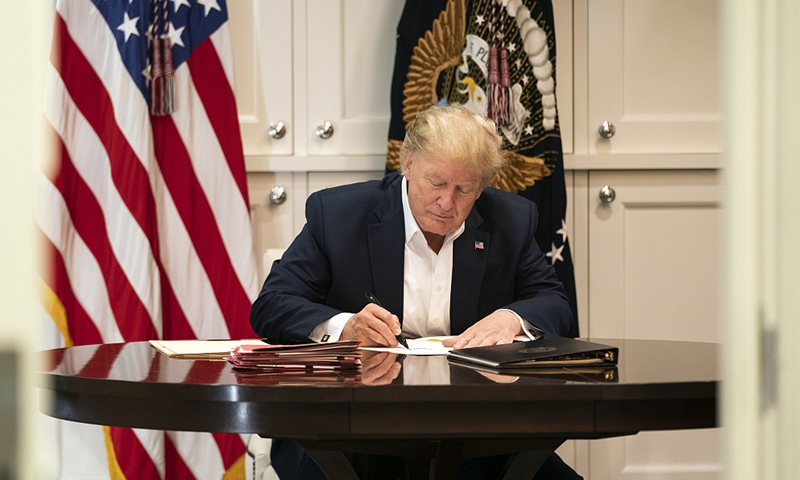Trump, released from hospital following 3 days of VIP treatment, sets a poor example: experts
By Shan Jie Source: Global Times Published: 2020/10/6 15:21:11 Last Updated: 2020/10/6 15:26:19

The Marine One carrying US President Donald Trump arrives at the White House in Washington, D.C., the United States, on Oct. 5, 2020. US President Donald Trump, still recovering from COVID-19, left hospital on Monday evening though one of his doctors said he "may not be entirely out of the woods yet." (Xinhua/Liu Jie)
US President Donald Trump returned to the White House after undergoing three days of first-class treatment at the Walter Reed military medical center. While experts have noted Trump's eagerness to return to the upcoming presidential election, ignoring safety measures could set a bad example for his supporters and the country still struggling to put novel coronavirus under control.
Trump left Walter Reed military medical center at 6:30 pm Monday local time and was taken back to the White House by the Marine One helicopter. Even though Dr. Sean Conley, Trump's personal physician, said the president was "not out of the woods yet," Trump claimed in a video twitter post that he "felt better than he did 20 years ago."
"Don't let it (COVID-19) dominate you. Don't be afraid of it," Trump said in a minute-long video posted on Twitter. "We have the best medical equipment, we have the best medicines, all developed recently. And you're going to beat it."
Unlike millions of others, Trump received top-class medical treatment during his time at the hospital. As the Washington Post wrote, "the 74-year-old president is the VIP of VIPs in his battle against COVID-19."
On Friday night, Trump was taken by Marine One on a short flight to Walter Reed National Military Medical Center near Washington DC. The center has a luxury suite equipped with a kitchen, conference room and sleeping quarters, so Trump could work and perform his duties during treatment, according to a report from NPR.
Trump was taken care of by a medical team consisting of at least 13 doctors, whose names were mentioned by White House physician Conley during a briefing on Trump's health on Saturday.
He underwent a mixture of therapies for treatment. On Friday, after Trump said he had tested positive for COVID-19, he received an experimental combination of two monoclonal antibodies which could help the immune system, Time reported.
On Saturday, he was given the drug remdesivir, which has not yet been approved by the US Food and Drug Administration. CNN quoted a statement from the Biotech company Regeneron, the maker of the drug, that said it "provided the drug after receiving a 'compassionate use' request from Trump's doctors."
The next day, his doctors also used another drug dexamethasone on him, which could control the inflammatory response "common in more advanced stages of the disease," said the Time.
In addition to the detailed medical treatments, Trump's hospitalization was also costly when it came to manpower. When a "suspicious package" was found near the medical center on Sunday, the area was cordoned off and shut down for the president's personal safety.

Photo: VCG
However, Trump, who immediately took off his protective face mask when he returned to the White House, could hardly convince average Americans that an ordinary person's battle against COVID-19 would be as smooth as his experience.
The COVID-19 death toll in the US surpassed 210,000 on Monday, accounting for more than one-fifth of the world's total deaths. The total confirmed cases there have hit 7.45 million, according to Johns Hopkins University data.
Inside the White House, COVID-19 cases are also mounting and the virus is infecting more of Trump's staffers. In addition to Trump and his wife Melania Trump, White House Press Secretary Kayleigh McEnany, principal assistant White House press secretary Chad Gilmartin, Trump's assistant Nicholas Luna and more names have entered the list of confirmed COVID-19 cases, local media has reported.
"Trump has not fully recovered from the virus yet. He remains in the early stages of the illness and great uncertainty still remains," Yang Zhanqiu, deputy director of the pathogen biology department at Wuhan University, told the Global Times on Tuesday.
"He has access to the best medical resources, so it is more likely he will recover. But meanwhile, as a 74-year-old man, his illness could worsen at any time." Yang said that Trump is unlikely "a patient with only mild symptoms".
"His illness might be more serious, that's why he was hospitalized. He should not be discharged so soon and let run around… it could negatively influence the American public and has the risk of spreading the virus to anyone nearing him," Yang said.
"Trump has received first-class treatment, so he believes he will be kept fine," Li Haidong, a professor at the Institute of International Relations of China Foreign Affairs University, told the Global Times on Tuesday. "But it shows his arrogance concerning the virus."
"He is eager to return to the presidential election without having to undergo a strict quarantine process. He has set a very bad example for the country and the world by saying the virus is not something to be afraid of," Li said.
Even though Trump has been infected with COVID-19, he continues to politicize the pandemic, which is a tragedy not only for himself, but also for his supporters and other people in the US.
"Trump is setting a bad example and being unsafe. The Trump administration has been very irresponsible and ignorant of the fact that many Americans are still struggling," Tejas Santanam, a resident in Georgia, US, told the Global Times on Tuesday.
"Trump should follow scientific guidelines and stay isolated rather than being discharged and going back to the White House with no mask."

Photo: VCG
'Finest' treatment
Jacob Glanville, CEO of Distributed Bio and Centivax, said that "antibody therapies typically cost $8,000 to $10,000 per dose," CBS reported on Monday. According to Newsweek, a five-day remdesivir treatment course could cost $3,120.
"$3,000 drug by the way... more than he paid in taxes," a Twitter user was quoted by the Newsweek report.
Additional costs are difficult to estimate, such as spending on security and the presidential suite at Walter Reed.
There are not many people who could afford such treatment in the US. The Business Insider reported in May that an American without insurance would pay around $73,300 for a 6-day hospital stay, and there are 27 million uninsured poor Americans. Another poll showed that one in seven Americans do not seek treatment as they might not be able to afford it.
"Feeling heartbroken for the ongoing hardship of these patients. Sincerely hope all of them can receive the same 'finest' treatment and care as the President," Hua Chunying, a Chinese foreign ministry spokesperson, posted on Twitter on Sunday.
Posted in: AMERICAS